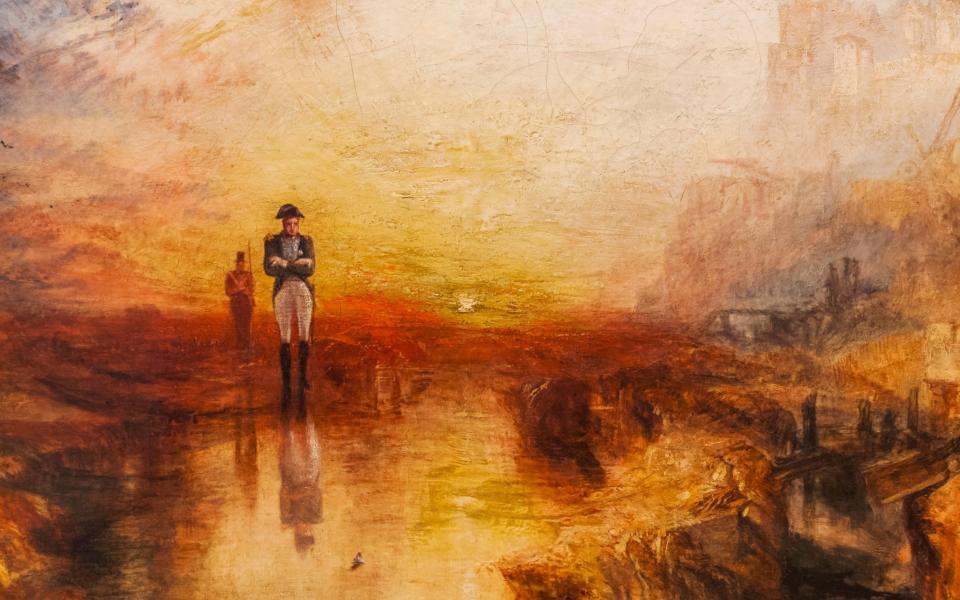Letters: Labour lacks the moral vision to stand up for Israel on the global stage

- Oops!Something went wrong.Please try again later.
SIR – The International Criminal Court (ICC) has rightly been criticised for seeking the arrest of Benjamin Netanyahu, the prime minister of Israel, for alleged war crimes in Gaza (“US condemns ICC calls for Netanyahu arrest warrant”, report, May 21). On the day that the UN Security Council observed a minute’s silence for Ebrahim Raisi, the Butcher of Tehran, the hypocrisies of these global organisations were laid bare.
Just as concerning is the support of the Labour Party for the ICC (report, May 21). International collaboration that aims to maintain peace and security should be lauded and protected. When this is not the case, however, we should be prepared to call it out, and, if necessary, take action to protect our interests and those of our allies.
Simon Malcolm
Beaconsfield, Buckinghamshire
SIR – Labour’s spineless backing of the ICC offers a useful glance at our future under a government led by Sir Keir Starmer.
Pressurised by extreme elements within Labour’s parliamentary party and its wider membership, its position has changed beyond all recognition from its initial support for Israel’s right to self-defence in the immediate aftermath of the atrocities committed by Hamas.
Sir Keir’s lack of principle and his failure to support the Government’s position that the ICC has no jurisdiction over the current conflict is further proof that he is untrustworthy, weak and lacks conviction.
Labour’s carefully crafted mask is starting to slip.
Philip Duly
Haslemere, Surrey
SIR – The ICC prosecutor’s decision to apply for an arrest warrant for Benjamin Netanyahu is clearly a political gesture (report, May 21).
The ICC judges must reject the application. Hamas is guilty of the severest of war crimes; Israel is acting in self-defence, while taking precautions to limit the number of civilian casualties.
To suggest that it is using starvation of civilians as a method of warfare, intentionally directing attacks against a civilian population, or committing other crimes against humanity, is a gross misrepresentation of its justifiable battle against very dangerous terrorists.
His Honour Cdre Jeff Blackett
Former Judge Advocate General
Midhurst, West Sussex
SIR – International arrest warrants have been requested for Israelis defending their nation against a murderous terrorist organisation.
No such warrants have been issued for anyone for the slaughter of more than 300,000 innocent civilians in Syria. It’s often said justice is blind, but two-faced?
Doug Prentice
Bexhill-on-Sea, East Sussex
Infected blood scandal
SIR – I am horrified by the conclusions of the inquiry into the infected blood scandal (report, May 21). The suffering of those affected is appalling, and is compounded by the fact that it has taken half a century for the truth to prevail when other countries have resolved such injustices so much more speedily.
I am also angry that the people responsible for such a catastrophe appear to face little in the way of meaningful punishment for their irresponsibility, corruption, indifference, complacency or cynicism. The loss of an honour or a reputation is small beer compared with the pain they have inflicted on others.
Financial compensation may be some redress to the victims, but that burden falls on the taxpayer – whom these people have also betrayed.
Paul Berry
Barnstaple, Devon
Short prison sentences
SIR – Your report, “Thousands of criminals spared jail to ease crowding” (May 20), side-steps the critical point that short prison sentences have been proven to be less effective at reducing reoffending than community sentences and suspended sentences. This isn’t about being “soft” on crime; it is about following the evidence of what works.
Even a short prison sentence can destroy someone’s life. People lose their home and job, and their children can be taken into care. When they come out of prison they must start again from scratch, which makes dealing with the problems that led to their offending much harder. This was the case even before the prisons started running out of space.
If we really want to see less crime, fewer victims and safer communities, we need to look at the evidence for what is effective. We call on all political parties to support the presumption against short sentences as a commonsense way to reduce crime.
Campbell Robb
Chief executive, Nacro
Pia Sinha
Chief executive, Prison Reform Trust
London EC2
Made in China
SIR – Gerry O’Neill (Letters, May 20) is quite right in saying that we all have the option of avoiding purchasing Chinese-manufactured goods. Carrying this out is another matter.
Trying to identify where an item is manufactured is no longer easy, especially when buying online. Goods are sourced abroad, especially from China, and are then sold on by companies in Britain or Europe.
For decades you knew that household items sold by the well-known and trusted brands, from electrical goods down to nails and screws, were produced in Britain. Now these are almost entirely made abroad and mainly in China. Buying a new freezer that is not made in China is nearly impossible.
There does not appear to be any legal requirement to indicate the country of manufacture.
C L Wallace
Shrivenham, Oxfordshire
Yet more mayo
SIR – I was horrified to read that Marks & Spencer will be adding even more mayonnaise to its sandwiches (Business, May 20).
Unable to buy a sandwich without mayonnaise, I make my own when going to town for a day’s shopping.
Rosemary Rowley-Wootton
Kidderminster, Worcestershire
Ukraine’s struggle
SIR – The West well understands that bombing German and Japanese infrastructure was one of the turning points of the Second World War and prevented the conflict from being longer and bloodier.
Yet we seem singularly determined to deny the Ukrainians the ability to strike into Russia, even though we can trust them to do so within the rules of armed conflict.
We have been drip-feeding Ukraine military hardware in order to keep it in the game, but not enough to enable it to win. In doing so, the West is allowing this conflict to become a protracted disaster, and we watch as more innocent lives, homes and cities are destroyed every day.
Some politicians have won kudos for their support for the underdog, but that is totally inadequate given the death and destruction unfolding on the Continent.
It is quite possible that history will judge that the West played a large part in sustaining this genocidal war. It is not too late to intervene decisively, but Western leaders look too weak to do more than tinker. I fear that we will look back on this with shame.
Colonel Mark Rayner (retd)
Eastbourne, East Sussex
SIR – As an American reader, I am always interested in how you look at my country and its politics.
However, Allister Heath is wrong to assert that American opposition to supporting Ukraine is a “problem [that] is now cross-party” (Comment, May 16).
The vote in which “many Republicans acted abominably” (no disagreement there) can be seen by anyone looking for it at the website of the Clerk of the House of Representatives. The number of Democrats who opposed aid to Ukraine was exactly zero.
D J McGuire
Suffolk, Virginia, United States
Stage delight
SIR – I was sad to see the obituary (May 17) of James Laurenson, who was one of my favourite actors.
I was fortunate to see him and Alan Dobie in the Peter Hall production of Waiting for Godot. Terence Rigby was also impressive as Pozzo, and I’ll never forget Richard Dormer’s extraordinary delivery of Lucky’s soliloquy.
James Laurenson was of course memorable in many different roles, and it was always a delight to see him in the cast. He was definitely one of the greats – and will be much missed.
Gail Cornish
Glastonbury, Somerset
French rock star: when Napoleon left St Helena

SIR – The latest Peterborough diary (May 18) notes that the Commonwealth Parliamentary Association is having a conference on the island of St Helena, “where Napoleon is buried”.
Napoleon is no longer buried on the island where he died in exile; less than 20 years after his death, the British government gave permission for his remains to be repatriated to France. Up to one million people are thought to have lined the streets of Paris for his state funeral in 1840, although it would be another 20 years before his remains were finally entombed at Les Invalides.
Napoleon’s original resting place on St Helena was bought by the French government in 1858 and can be visited by delegates, who are described in the report as including “politicians from Westminster, Edinburgh, Cardiff, Belfast, Gibraltar and the Channel Islands”. This list fails to mention the delegates from the Isle of Man, whose legislature – Tynwald – claims to be more than 1,000 years old and thus “the oldest continuous parliament in the world”. While documentary evidence for an assembly bearing its name dates only from the early 15th century, Tynwald is certainly senior to the Johnny-come-lately assemblies named.
Nick Cowley
Nuthurst, West Sussex
Obstacles to education for children with autism
SIR – I write out of concern over the lack of facilities and “special” schools for children with autism.
As a grandmother of an autistic seven-year-old boy, I have seen just how difficult each stage of the education process is, from getting an Education Health and Care Plan to maintaining the necessary funding that will enable him to survive in a state-school environment that isn’t set up for his needs.
While the school staff are extremely sympathetic and helpful, they aren’t trained in how to deal with children on the autistic spectrum.
Though awareness of autism is increasing, and funding promised by governments, it is unfortunate that the number of suitable schools is not keeping up with the number of children who need them. The bureaucratic hoops that parents have to jump through to find a suitable school for their autistic child are unbelievably long-winded, counterproductive and frustrating, and seem to be designed to deter parents at each stage.
Every child, regardless of their ability, is entitled to an education that is suited to their needs and that will, in turn, nurture their talents and equip them for a world in which they can thrive independently. Autism should not preclude this.
Susan Pathak
Epsom, Surrey
Letters to the Editor
We accept letters by email and post. Please include name, address, work and home telephone numbers.
ADDRESS: 111 Buckingham Palace Road, London, SW1W 0DT
EMAIL: dtletters@telegraph.co.uk
FOLLOW: Telegraph Letters @LettersDesk
NEWSLETTER: sign up to receive Letters to the Editor here

